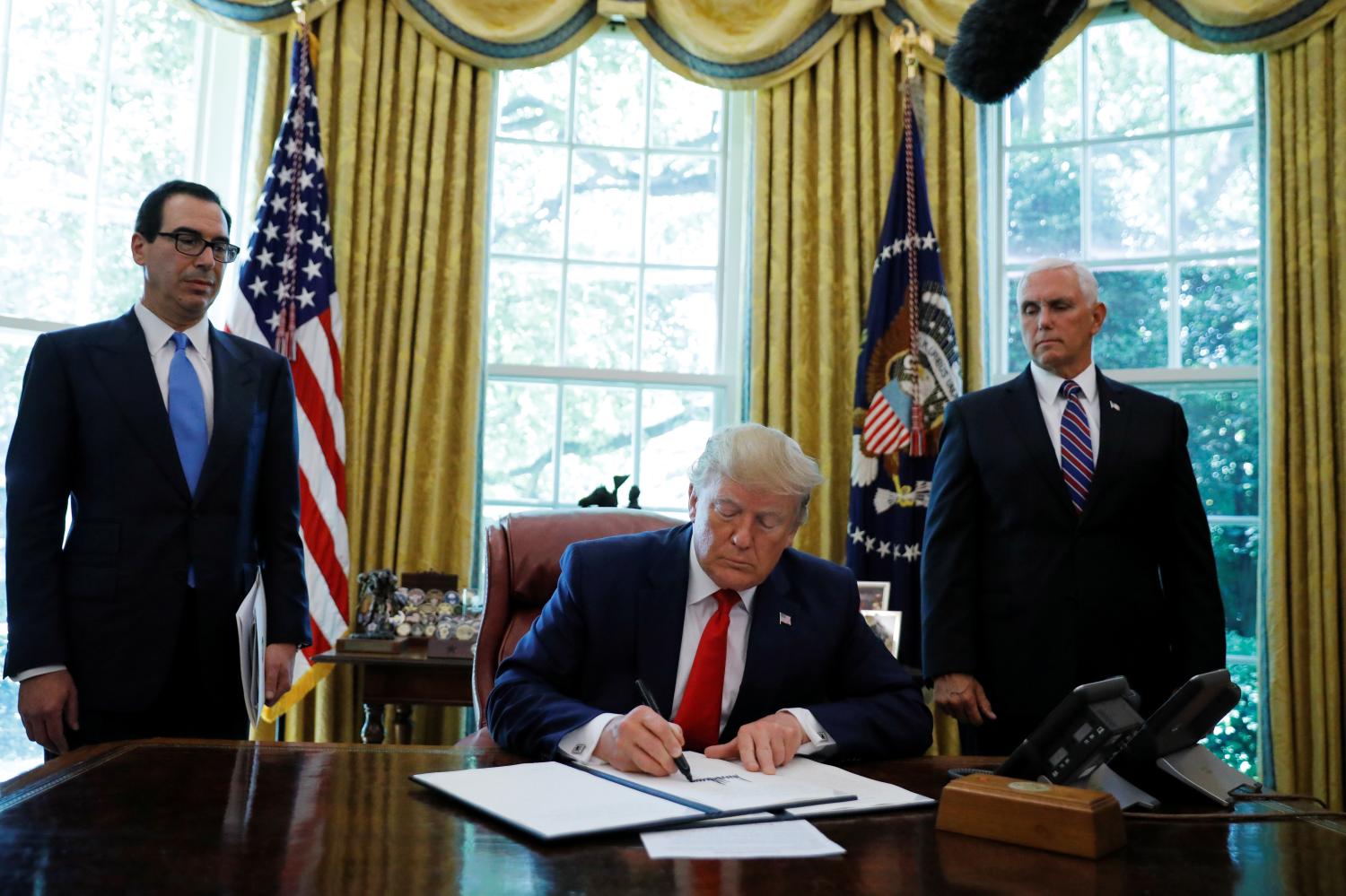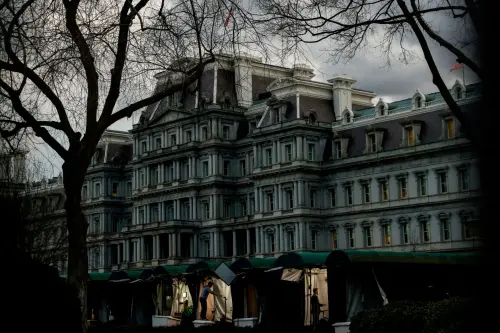The following is a summary of the fourth session of the Congressional Study Group on Foreign Relations and National Security, a program for congressional staff focused on critically engaging the legal and policy factors that define the role that Congress plays in various aspects of U.S. foreign relations and national security policy.
On June 26, 2020, the Congressional Study Group on Foreign Relations and National Security convened online to discuss the use of economic sanctions. Few tools have seen such wide and aggressive use, especially as part of the Trump administration’s maximum pressure campaign on Iran. But should Congress be concerned about the risk of the executive branch using sanctions broadly enough to undermine U.S. global economic power? Or in a way that risks undermining Americans’ civil liberties at home and humanitarian policies overseas?
To discuss this topic, the study group was joined by three experts in U.S. sanctions law and policy: Edward Fishman of the Atlantic Council, who previously served on the State Department’s policy planning staff; Liza Goitein of the Brennan Center for Justice; and Peter Harrell of the Center for a New American Security, who previously served as Deputy Assistant Secretary of State for Counter Threat Finance and Sanctions. Prior to the session, the study group was referred to several articles as background reading, including:
- Edward Fishman, “Only Congress Can Solve the North Korea Problem,” New York Times (May 2, 2017);
- Edward Fishman, “Even Smarter Sanctions,” Foreign Affairs (Nov./Dec. 2017);
- Peter Harrell, “Is the U.S. Using Sanctions Too Aggressively?” Foreign Affairs (Sept. 11, 2018);
- Peter Harrell, “How to Reform IEEPA,” Lawfare (Aug. 28, 2019);
- Elizabeth Goitein and Andrew Boyle, “Limiting this Governmental Emergency Power Could Curb Presidential Overreach,” Fortune (Mar. 4, 2020);
- Edward Fishman, “How to Fix America’s Failing Sanctions Policy,” Lawfare (June 4, 2020);
- Peter Harrell and Elizabeth Goitein, “How Iran Became the New Battle Line Between Conservatives and Twitter,” Politico (June 16, 2020).
The study group coordinator Scott R. Anderson also circulated a handout (download here) with some information on relevant legal authorities for attendees’ reference.
Fishman began the conversation with an analysis of the strengths and weaknesses of U.S. economic policy and the ways in which it is currently failing. Over time, he noted, sanctions have been used to pursue more ambitious objectives against a higher profile array of targets. But it’s often proven ineffective, for what he identified as three reasons: first, they tend to be too convoluted due to the various agencies and authorities used to pursue them, often with inadequate coordination with other policy stakeholders; second, they are too static, as there are few incentives for updating sanctions regimes and rescinding them is often viewed as a binary decision; and third, they are too incremental, as they often are not imposed until after a crisis is underway, in part due to inter-agency disagreement and a lack of coordination with foreign allies. Fishman argued that these deficiencies could be addressed by situating sanctions in a strategic framework that uses more nuanced benchmarks to leverage both the threat of imposing sanctions and the prospect of securing sanctions relief. Fixed expiration dates and periodic review requirements, meanwhile, could promote more dynamics, while more advanced planning and multilateral coordination could encourage more forward-looking policy formulation. Finally, providing funding for cross-training opportunities for personnel in relevant agencies–particularly the State Department and Treasury Department–could improve inter-agency coordination, just as funding policy research could help further the development of a coherent theory of sanctions and how they may best be used.
Harrell continued the conversation by fleshing out some of the more legal and technical details behind U.S. sanctions policies and expanding on how they have been used. In recent years, he noted, the United States’ expansive use of sanctions–including more controversial secondary sanctions, which target third parties who do business with a sanctioned entity–has been driven by both the executive branch, which acts through delegations of authority like the International Emergency Economic Powers Act (IEEPA), and Congress, which has increasingly enacted its own statutory sanctions programs and played a growing role in implementation by overseeing removals and pursuing “nominations” for entities to be sanctioned. This has triggered concerns in some quarters that the United States is overreaching in its sanctions policies, and reaching a point where it may trigger enough of a backlash that it will lose its central role in the global economy and thus lose its ability to pursue such policies. While one should not overstate this risk, Harrel noted, the potential consequences are significant enough to warrant some prudent measures to right-size sanctions policies, including expanded cost-benefit analysis by both branches for new sanctions programs, expanded opportunities for public comment, requirements that presidential administrations articulate a sanctions strategy, and an increased focus on sanctions with multilateral support that do not pose the same risks.
Goitein closed out the conversation by noting some of the threats that some sanctions policies can pose to other major U.S. policy concerns. Focusing on IEEPA-based sanctions, she observed that, on the international front, humanitarian exceptions placed into sanctions laws and regulations were often unsuccessful at preventing major disruptions in the flow of humanitarian and other essential goods and services into affected areas, which often result from the chilling effect that sanctions have on commercial relationships with sanctioned entities. At times, as in the recent case of Iran, this has resulted in some pushback, including by longtime U.S. allies, who have sought ways to circumvent U.S. sanctions in order to provide some such goods and services. Meanwhile, domestically, the broad reach of many IEEPA sanctions has affected American individuals and corporations in ways that have a direct bearing on their speech and other activities. After the September 11th attacks, she noted, an array of sanctions were imposed on several Muslim charities that ultimately led to their collapse, even though several courts ultimately found that parts of the process used to apply those sanctions were unconstitutional. A greater congressional role could help curb some of these abuses, Goitein argued, especially if Congress played more of a recurring role in authorizing sanctions and thus could also help limit their scope and ensure that they were being used in a manner consistent with broader U.S. policy interests.
From there, the study group moved into open discussion. Among the topics covered were Congress’s approach to statutory sanctions, challenges that Congress’s committee structure poses to the oversight of sanctions policies, and what sort of threat overreach could actually pose to the U.S. global economic role.
Visit the Congressional Study Group on Foreign Relations and National Security landing page to access notes and information on other sessions.
The Brookings Institution is committed to quality, independence, and impact.
We are supported by a diverse array of funders. In line with our values and policies, each Brookings publication represents the sole views of its author(s).



